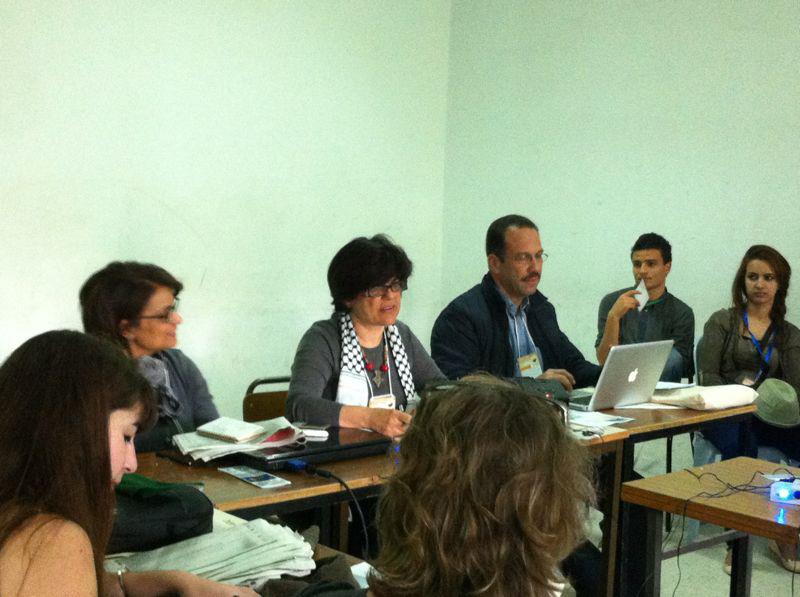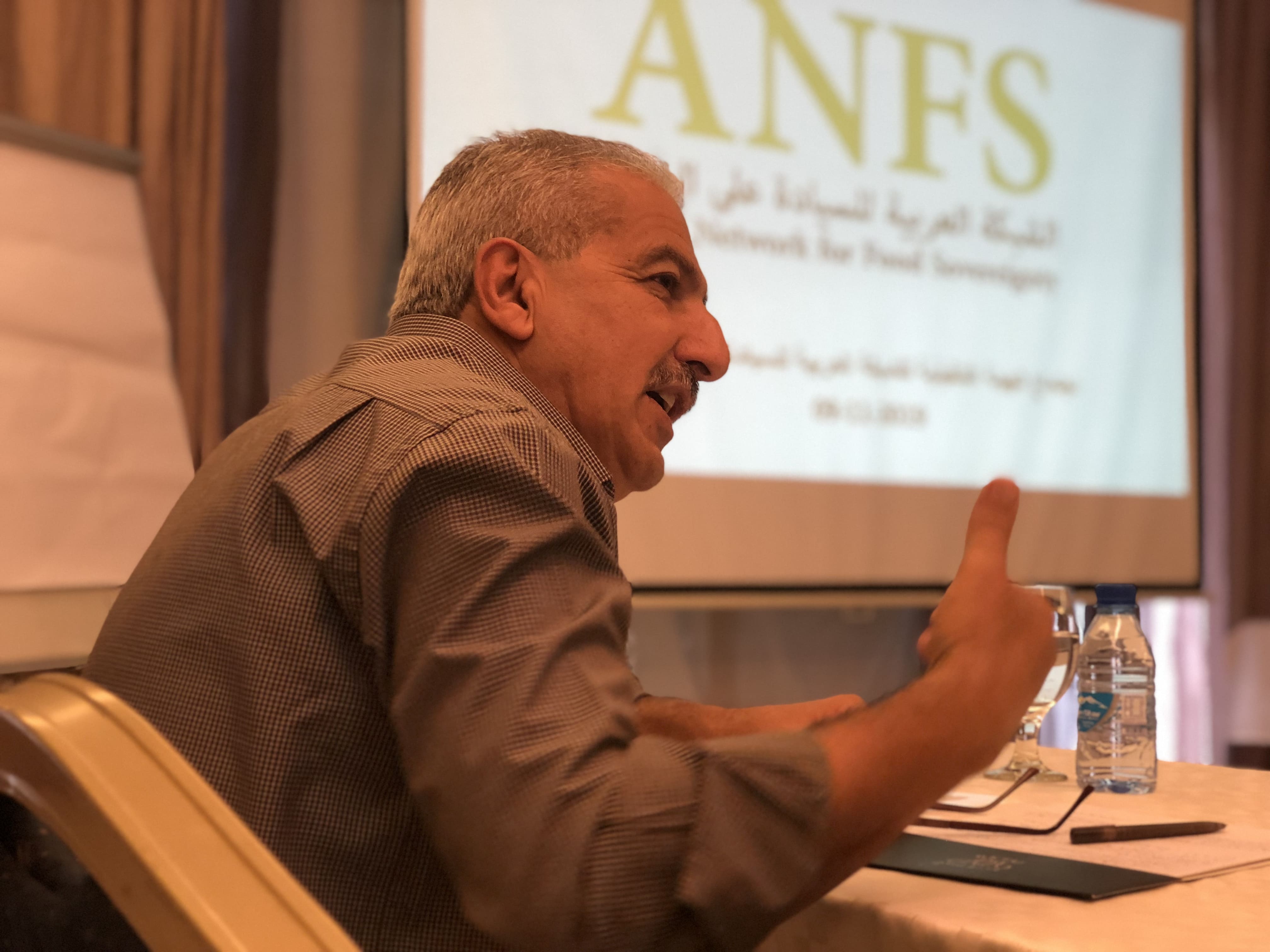Back in 2012, APN and a group of Arab civil society organizations established the Arab Network for Food Sovereignty (ANFS) in Beirut, Lebanon, as an independent civil coordinating body based on the principles of food sovereignty, strengthening resilience strategies, and confronting the underlying causes of social, economic, agricultural, and environmental vulnerabilities facing Arab societies. The Network encompasses over 35 NGOs and unions of farmers, fishermen, shepherds, workers, women, and youth, in addition to consumer associations located in 13 different Arab countries.
Why the Arab Network for Food Sovereignty?
Arab countries have among the highest food import dependency rates, making the region highly vulnerable to fluctuations in the supply and price of the international food market. Despite the fact that agriculture employs between 53 percent and 84 percent of the Arab labor force, the region imports approximately half its caloric intake and is the largest cereal importer in the world.
There are several factors contributing to the agricultural incompetence in the region. Environmental factors, particularly water scarcity and climate change undoubtedly play a role in reducing productive potential, while high population growth rates of over 2% add pressure to increasingly scarce resources. More importantly, however, are the nutrition, environmental, and agricultural policies that primarily determine the level of regional food security. The decline in investment in agricultural productivity and the absence of governmental support for infrastructure and extension services have caused detrimental effects on the state of production and resource sustainability. Moreover, the high import dependency ratio has dire consequences for food stability, considering the high likelihood of disruption in trade due to chronic regional conflicts and crises.
The sector requires targeted investment in agriculture, research and development, and technology at the national and regional levels. Governments must empower smallholder farmers and work to reduce losses and waste from the sector. New policies are needed to harness a sustainable agricultural sector that manages and protects essential natural resources, including water, land, and seed. The region, the birthplace of agriculture, has incredible potential to boost productivity and enhance food security. The Arab Network for Food Sovereignty was initiated to work towards achieving that potential.
Strategic Goals
The Arab Network for Food Sovereignty aims to achieve the following goals:
1. Promote concepts, practices, and strategies for food and natural resource sovereignty in the Arab world;
2. Improve institutional and community capacity to enhance the role and effectiveness of civil society organizations working in the fields of agriculture and food security;
3. Embrace, encourage, and mobilize innovative and creative initiatives, activities, and campaigns in the areas of food security and food sovereignty at the community and institutional levels.
4. Strengthen the cooperation and coordination of Arab, regional and global networking to exchange expertise and to serve the vision and strategy of the Network;
5. Influence governmental and non-governmental policies and regulations on the local, national, and international levels to achieve food and natural resource sovereignty.
Executive Committee
The General Assembly of the Arab Network for Food Sovereignty met on 22 September 2021, and voted for the following Executive Committee:
1. Razan Zuayter - The Arab Group for the Protection of Nature – Jordan
2. Munjed Abu Jaish - Agricultural Development Association (PARC) - Palestine
3. Hanada Sadat - Syrian Society for the Conservation of Wildlife - Syria
4. Haidar Dekmak - The Coalition of Lebanese Civil Society Organizations - Lebanon
5. Abbas Rahi - The Iraqi Organization for Community and Environmental Rehabilitation – Iraq
6. Leith Ben Besher - Syndicat des agriculteurs de Tunisie - SYNAGRI - Tunisia
7. Abdullah El Blihi - National Confederation for Traditional Fishing in Morocco – Morocco
8. Abla Ahmad - Hawa Association – Sudan
9. Sayed Ahmed Obeid - The National Fishing Federation – Artisanal Section (FNP) – Mauritania
Main Headlines:
-
On 25 August 2022, ANFS executive board held a meeting attended by ANFS Founder and APN Chairperson, Razan Zuayter. (More)
-
ANFS issued a statement warning of the collapse of food systems in Gaza as a result of continuous and systematic Israeli bombing.
-
The Arab Network for Food Sovereignty elects a new Executive Committee to serve the period (2021-2023). The General Assembly held its annual meeting, during which it approved the financial and administrative reports for the years (2018 - 2021).
-
At the invitation of the Arab International Investor Forum, the President of the Arab Network for Food Sovereignty (ANFS) and the Chairperson of the Board for the Arab Group for the Protection of Nature, Eng. Razan Zuayter, participated in the preparatory meeting for the World Conference on Women and Sustainable Investment, on 7 September 2021, via Zoom, with the elites of legal and leading figures in the Arab world with the aim of preparing for the conference, and reviewing and discussing the draft of its public domain. (More)
-
In July 2021, ANFS and APN met the organizers of Action Track 5 of Food Systems Summits (FSS) to demand that the needs of people affected by wars and conflicts be included on its agenda. (More)
-
APN and ANFS provided critical interventions for preparatory meeting of FAO Regional Conference in the presence of the Assistant Director-General of the FAO and Regional Representative for the Near East and North Africa, AbdulHakim Elwaer. With the aim being to exchange ideas and consult on the priorities of the agenda of the Regional Conferences of the FAO. (More)
-
In May 2021, ANFS warned of the collapse of food systems in Gaza as result of Israeli bombing. (More)
-
APN, ANFS, and their partners completed a report for the Civil Society and Indigenous Peoples’ Mechanism of CFS (CSM) titled, “CSM Report on Monitoring the Use and Application of the Framework for Action for Food Security and Nutrition in Protracted Crises.” (More)
- ANFS and APN presented 14 recommendations at the ministerial meeting of FAO regional conference in September 2020. (More)
- On November 19th–20th, 2020, ANFS and APN met with the UN Special Rapporteur on the Right to Food, Michael Fakhri in two consecutive meetings. The first meeting focused on food security and food sovereignty in Lebanon, whereas the second meeting discussed the priorities of the UN special rapporteur for the years (2020-2023). (More)
- In August 2020, ANFS issued a statement about the massive explosion in the capital of Beirut, in which it warned of an acute food crisis that Lebanon will face as a result of the destruction of the port, which housed the main silos for storing grain and wheat. (More)
- In May 2020, ANFS issued a statement recommending the review of agricultural policies in the face of potential food crises. The statement included a set of demands related to Arab food systems during the time of the coronavirus crisis. (More)
- In 2019, APN organized the ANFS executive meeting in Amman, where Executive Board members met to review its strategic plan and to endorse its administrative and financial reports. APN also held the first Regional ANFS-PCFS meeting. (More)
- In 2018, the ANFS held its General Assembly in Beirut, and in collaboration with APN, organized a multistakeholder regional workshop on the implications of protracted crises on food security and nutrition in the Arab region. The conference was held in partnership with ESCWA.
- On behalf of ANFS, APN participated in the Food and Agriculture Organization’s 34th Regional Conference for the Near East, in Rome. The conference was attended by 11 ministers and 144 participants from 26 member states.
- In 2016, ANFS held its General Assembly in Amman, Jordan, in collaboration with APN. This was followed by an open meeting titled “the Institutionalization of Partnerships to Enhance Food Security and Nutrition in Jordan and the Arab World.”
- In 2016, ANFS and APN spoke on the right to self-determination at a series of events in Manila and Davao, Philippines.
- In 2013 APN and La Via Campesina organized an event at the World Social Forum in Tunisia to discuss the goals and aspirations of the Arab Network for Food Sovereignty. (More).
- In 2013, the ANFS co-organized the FAO’s Second Arab Civil Society Consultative Workshop on Food Security and Nutrition in Amman. (Find a copy of the Final Declaration of the Arab Civil Society Consultation (here).
- APN in cooperation with the International Peasant’s Movement (Via Campesina) organized, an important event on March 28, 2013, within the activities of the World Social Forum held in Tunis to present the idea of the Arab Network for Food Sovereignty.
- In 2013, ESCWA and APN invited ANFS members as Arab Civil Society representatives at the Expert Group Meeting on Green Agricultural Value Chains for Improving Livelihood in the Arab Region. (More)
- In 2012, APN organized the first Arab Civil Society Consultative Workshop on Food Security and Nutrition, in Beirut, during which the ANFS was formed. Major recommendations reached by the participants were presented to the 33rd FAO Regional Conference for the Near East, in Rome.


